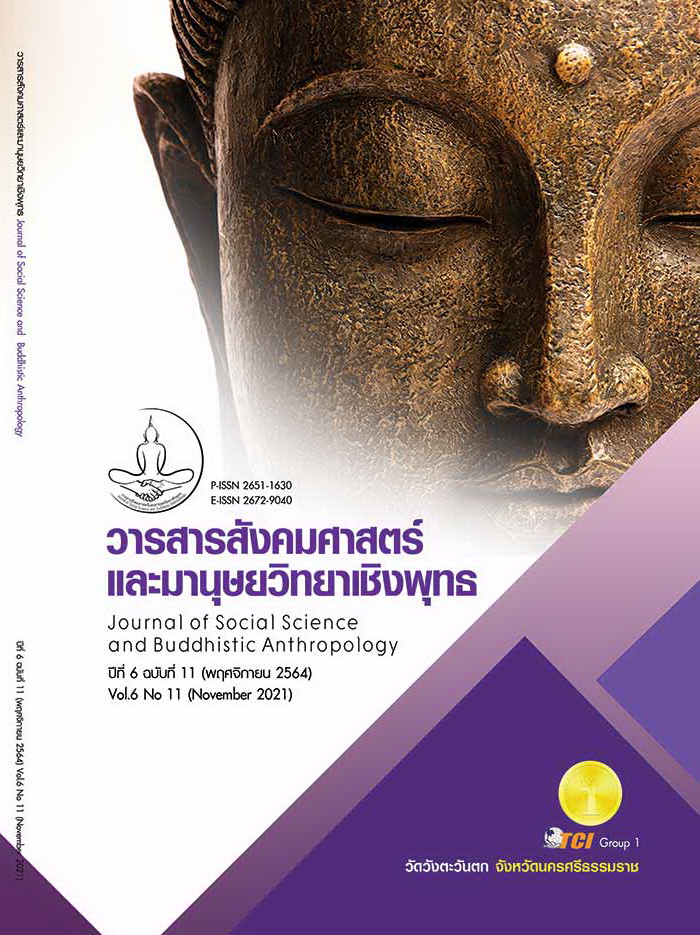THE DEVELOPMENT OF TRAINING PROGRAM FOR ENHANCING COLLABORATIVE PROBLEM SOLVING SKILLS FOR JUNIOR HIGH SCHOOL STUDENTS
Keywords:
Training Program, Cooperative Problem-Solving Skills, Social Process Skills, Thinking SkillsAbstract
The objectives of this research article were to 1) develop a training program to promote collaborative problem-solving skills for junior high school students and 2) examine the effects of implementing the training program to promote collaborative problem-solving skills for junior high school students by using a research and development (R&D) methodology. The sample of the study involved 30 junior high school students recruited through a cluster random sampling technique. The research instruments consisted of the training program to promote collaborative problem-solving skills for junior high school students. The data were analyzed using a mean, standard deviation, and multiple analysis of variance (MANOVA) with Hotelling's T2. The result showed that the training program comprised 14 activities to promote two components of collaborative problem-solving skills, that is, social skills (Participation, perspectives taking, and social regulation as well as thinking process skills including task regulation, learning, and knowledge building). The results from the assessment of the training program to promote collaborative problem-solving skills contained a mean of each activity in the range of 4.2 - 5.0 and a mean of overall activities at 4.58, the highest level of suitability. Moreover, it was found that the students’ scores of collaborative problem-solving skills after training ( = 46.97) were significantly higher than their scores before training (
= 44.33) at the .05 level.
References
ทิศนา แขมมณี. (2559). ศาสตร์การสอนองค์ความรู้เพื่อการจัดกระบวนการเรียนรู้ที่มีประสิทธิภาพ. (พิมพ์ครั้งที่ 20). กรุงเทพมหานคร: จุฬาลงกรณ์มหาวิทยาลัย.
สถาบันส่งเสริมการสอนวิทยาศาสตร์และเทคโนโลยี. (2560). PISA วัดอย่างไร. เรียกใช้เมื่อ 15 มกราคม 2561 จาก https://pisathailand.ipst.ac.th/issue-2018-25/
สถาบันส่งเสริมการสอนวิทยาศาสตร์และเทคโนโลยี. (2563). ความสัมพันธ์ในโรงเรียนกับผลการประเมินการแก้ปัญหาแบบร่วมมือ. เรียกใช้เมื่อ 15 มกราคม 2561 จาก https://drive.google.com/file/d/ 1JipbFWcPUUZ-iSnGRap0g_ TRvNGee3z8/view
สุรางค์ โค้วตระกูล. (2559). จิตวิทยาการศึกษา. (พิมพ์ครั้งที่ 12). กรุงเทพมหานคร: จุฬาลงกรณ์มหาวิทยาลัย.
เอกรินทร์ อัชชะกุลวิสุทธิ์. (2557). การประเมินด้านการแก้ปัญหาแบบร่วมมือ PISA 2015. นิตยสาร สสวท, 43(191), 37-41.
Anna, D. et al. (2011). Ten skills for the future workforce Future Work Skills 2020. California: University of Phoenix Institute.
Friedrich, H. et al. (2015). A Framework for Teachable Collaborative Problem-Solving Skills. In P. Griffi n & E. Care (Eds.), Assessment and teaching of 21st century skills: Methods and approaches (pp. 37-56). Dordrecht: Springer.
Greiff, S. et al. (2013). Perspectives on problem solving in cognitive research and educational assessment: analytical, interactive, and collaborative problem solving. Journal of Problem Solving (The), 5(2), 71-91.
Johnson, D. W. et al. (1994). The nuts and bolts of cooperative learning. Edina, Minnesota: Interaction Book Company.
Khoo, Y. Y. (2015). Collaborative Problem Solving Promotes Students’ Interest. Economics and Economic Education Research, 16(1), 158-167.
OECD. (2013). PISA 2015 Draft Collaborative Problem Solving Framework. Paris: OECD.
OECD. (2017). PISA 2015 Assessment and Analytical Framework Science, Reading, Mathematic, Financial Literacy and Collaborative Problem Solving. Paris: OECD.









